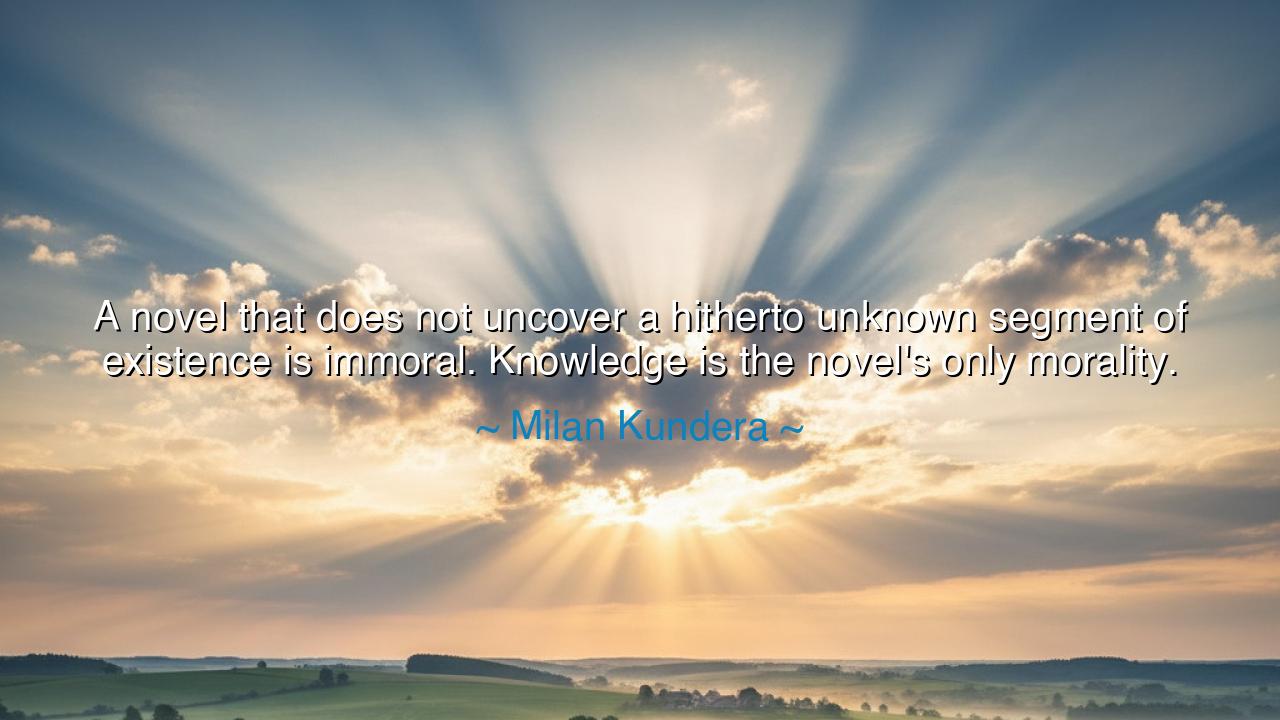
A novel that does not uncover a hitherto unknown segment of
A novel that does not uncover a hitherto unknown segment of existence is immoral. Knowledge is the novel's only morality.






“A novel that does not uncover a hitherto unknown segment of existence is immoral. Knowledge is the novel’s only morality.” Thus declared Milan Kundera, the philosopher of the human soul and the chronicler of exile, memory, and love. His words burn with quiet fire, for they are not only about the art of fiction, but about the purpose of truth itself. In these lines lies a commandment to all creators — and indeed, to all seekers of understanding — that art must not flatter what is already known, nor soothe the comfortable, but reveal what has been hidden, illuminate what has been ignored, and speak where silence has long reigned.
Kundera, who lived through the tremors of totalitarianism in his native Czechoslovakia, understood that the novel was not merely a tale told for pleasure, but a vessel of knowledge — a mirror of the secret corners of human existence. In an age where truth was censored and speech watched, he saw that to write truthfully was itself a moral act. Thus, when he calls a novel that hides truth “immoral,” he does not mean it sins against religion or politics, but against the very soul of humanity. For to conceal what is real, to pretend that life is simple when it is complex, to paint men and women as hollow ideals rather than as creatures of light and shadow — this, to Kundera, is the gravest betrayal of art’s sacred duty.
The novelist, then, is no mere storyteller. He is an explorer of existence, one who dares to descend into the depths where others fear to look. As the philosopher seeks wisdom and the prophet seeks divine vision, so the true novelist seeks understanding — of the human heart, of suffering, of the strange and beautiful contradictions that make us what we are. The morality of the novel, Kundera tells us, lies not in preaching virtue, nor in defending causes, but in revealing the truths that have not yet been spoken. To create without discovery is to speak without meaning; to tell stories that repeat the world’s lies is to sin against the sacred duty of art.
Consider Fyodor Dostoevsky, who in his time tore open the human conscience with works like Crime and Punishment and The Brothers Karamazov. He did not write to comfort the righteous, but to drag into light the struggle between guilt and grace, faith and despair. Through his pages, humanity glimpsed its own sickness and its yearning for redemption. Dostoevsky’s novels uncovered unknown territories of the human spirit, and by doing so, they purified the moral landscape. His art did not preach — it revealed. His knowledge became the world’s illumination.
Or look to Toni Morrison, who wrote of the pain and beauty of Black existence in America — stories long buried under silence. In Beloved, she gave voice to the enslaved, to memory, to trauma that history had tried to erase. Through her work, she uncovered a segment of existence unseen by many, and in doing so, fulfilled the very moral law Kundera speaks of. She did not write to please; she wrote to awaken. And in awakening others, she proved that art and knowledge are one, and that truth — even when painful — is the highest form of compassion.
So when Kundera speaks of the “immorality” of a novel that reveals nothing new, he speaks not only to writers, but to every soul that lives by repetition and complacency. To walk through life seeing only what others have seen is to live falsely. But to open one’s eyes, to question, to perceive the unspoken currents of existence — that is to live truthfully, and thus morally. The quest for knowledge, whether through words or experience, is the sacred duty of all who wish to remain awake in the world.
Let this teaching, then, be your compass: in whatever you create, seek to reveal, not to repeat. Do not be content with borrowed truths, for the world is vast and filled with hidden chambers of meaning. Whether you write, paint, teach, or live quietly among others, let your life itself be a novel that uncovers new ground. Seek to understand what others overlook — the unseen pain, the quiet beauty, the contradiction within the ordinary. That is your moral calling.
And remember always: knowledge is the only morality, because it alone dispels ignorance, cruelty, and fear. To seek truth is to serve life; to uncover what is hidden is to free the soul. So walk boldly, child of the future, into the unknown segments of existence — and there, in the light of discovery, may you find not only art, but wisdom.






AAdministratorAdministrator
Welcome, honored guests. Please leave a comment, we will respond soon